The best pitcher never to have won a Cy Young Award is off to a historic start. Gerrit Cole of the Yankees makes his sixth start tonight at Texas. He has zeroes at the beginning of his ERA (0.79) and under the columns of losses and home runs allowed.
Since MLB started handing out Cy Young Awards in 1956, only six other pitchers started a season with triple zeroes like this. Four of them went on to win the Cy:
Triple-Zero Start
0 Losses, 0 Home Runs, ERA Begins with 0
(First 25 Games, Minimum 34 Innings, Since 1956)
| Player | Year | W-L | ERA |
|---|---|---|---|
Mike Norris |
1980 |
4-0 |
0.44 |
Fernando Valenzuela* |
1981 |
6-0 |
0.33 |
Roger Clemens* |
1991 |
6-0 |
0.73 |
Zack Greinke* |
2009 |
5-0 |
0.50 |
Ubaldo Jimenez |
2010 |
5-0 |
0.79 |
Dallas Keuchel* |
2015 |
3-0 |
0.73 |
Gerrit Cole |
2023 |
4-0 |
0.79 |
Why is Cole throwing the best baseball of his career at a time when his velocity is down? That’s precisely the point: He is trying less. Fastball command is his key.
Cole has finished in the top five in Cy Young voting five times. He finished ninth last year with a 3.50 ERA, his highest ERA since 2018, when he transitioned from a sinkerball pitcher to a four-seam dominant power pitcher. His problem last year was home runs. Cole gave up a league-worst 33 of them, including 16 on his four-seamer. He was too predictable with his fastball, and when hitters hunted those fastballs Cole obliged with too many over the heart of the plate.
This season his fastball has subtle but important differences. Compare his 2022 fastball metrics to his ’23 fastball metrics:
Cole Fastball
| Year | MPH | PCT. | SLG | Vert. Release | Extension |
|---|---|---|---|---|---|
2022 |
97.8 |
51.9% |
.420 |
5.78 |
6.5 |
2023 |
96.8 |
53.8% |
.175 |
5.90 |
6.3 |
Cole’s fastball is down a full tick in miles per hour. But he is using it more. And look at his vertical release point and his extension. He is releasing the ball from a higher arm slot and with less extension—a shorter stride. It equates to what Sandy Koufax once called “taking the grunt out” of his fastball. Cole has throttled back on the power to gain better command.
Here’s a side-by-side comparison of Cole’s fastball deliveries from 2022 and ’23. On the left is a home run by Carlos Santana last year on a 99-mph heater. On the right is a strikeout of Max Kepler this year at 97. Start with the top of his delivery during the load phase:
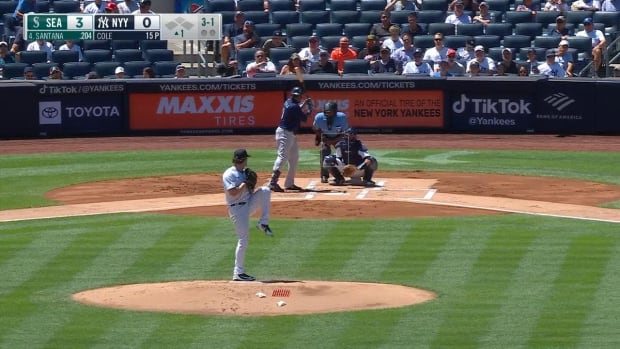
This season Cole keeps his hands in front of his chest (note the glove is lower) and keeps the front foot flat under his knee. The delivery has been simplified slightly.
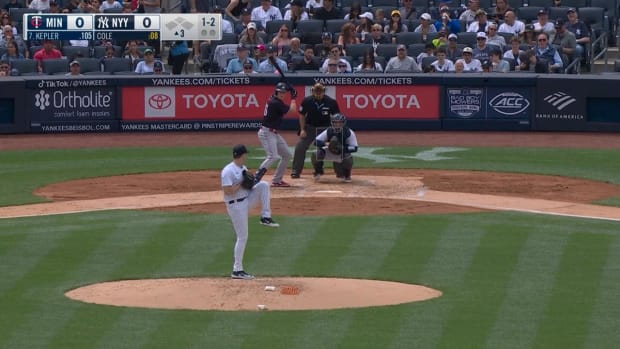
Now look at Cole at the moment of ball release:
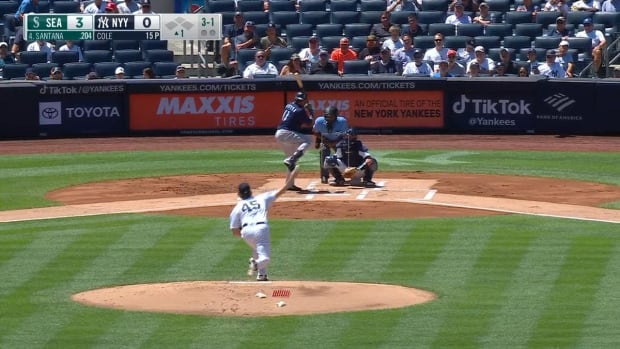
Cole’s head and hand are slightly higher—by 1 ½ inches, according to StatCast. That’s primarily because he is not striding as far down the mound. Cole has shortened his release extension point by almost 2 ½ inches. Again, it’s a subtle change, but it is helping Cole command his fastball better.
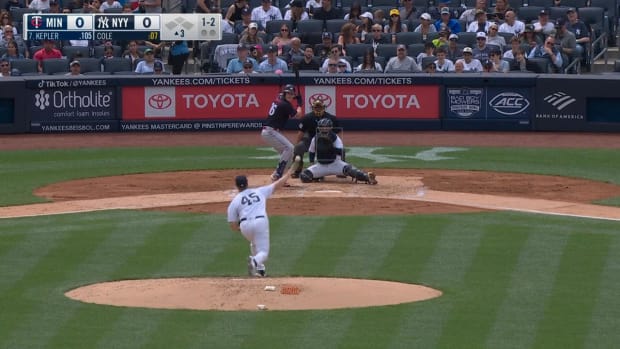
Now look at the location of the two fastballs as they enter the hitting zone:
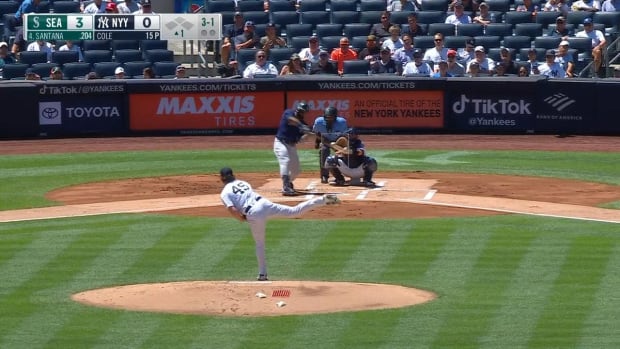
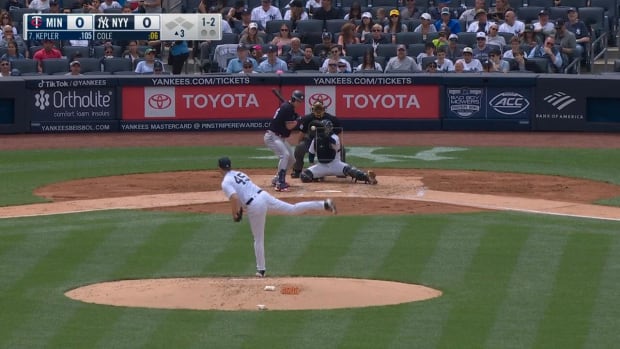
You can see the overall change in location from Cole’s fastball heat maps from 2022 and ’23:
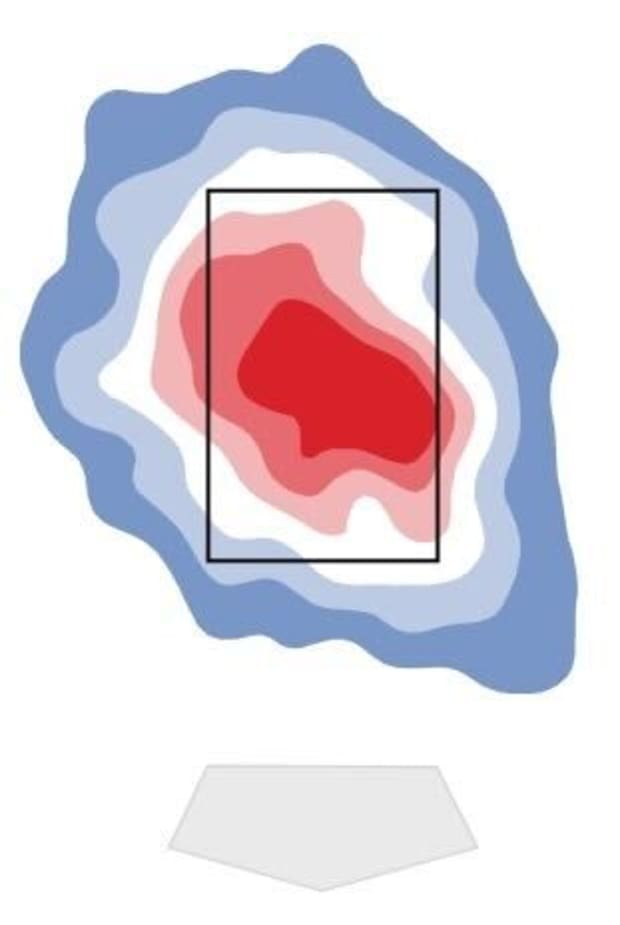
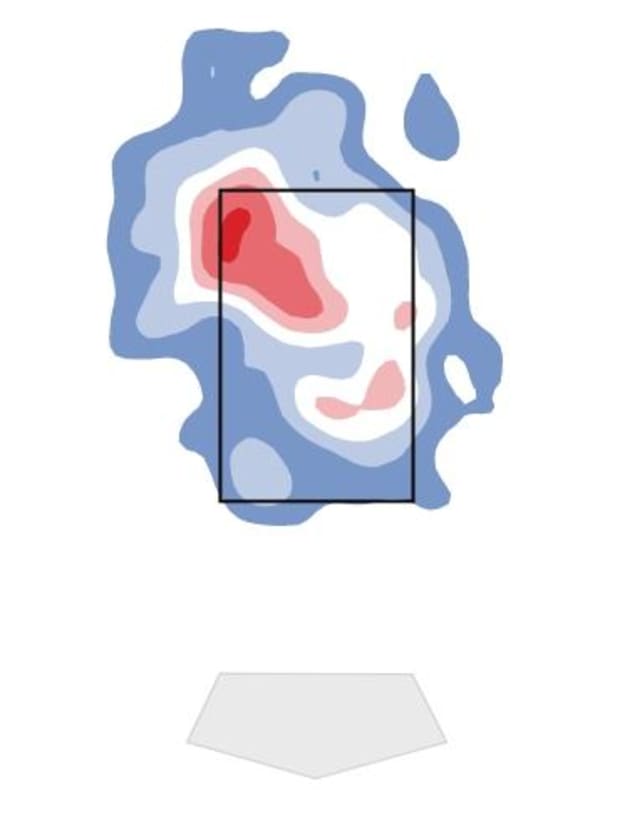
Cole is keeping his fastball out of the middle of the plate and dotting the arm-side elevated fastball. Here is another way to see the difference in how Cole has moved his fastball out of the middle and to the edges:
Cole Fastball Location
| Year | Heart | Shadow |
|---|---|---|
2022 |
28.4% |
46.3% |
2023 |
24.5% |
49.1% |
Most Four-Seam Fastballs in Shadow of Strike Zone, 2023
| Player | No. | Pct. |
|---|---|---|
Spencer Strider, Braves |
142 |
50.5% |
Justin Steele, Cubs |
137 |
48.1% |
Gerrit Cole, Yankees |
132 |
49.1% |
Cole is making it look easy. And that’s the point. His smooth delivery is even more pure and fluid than it has been. Last season Cole hit 99 mph 17 times in April. This month he has done so only three times. But in search of his first Cy Young Award, Cole is proving fastball command is more important than fastball velocity.







